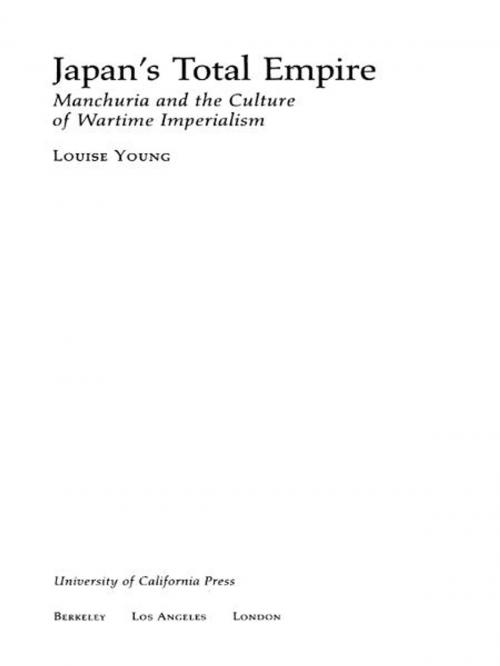Japan's Total Empire
Manchuria and the Culture of Wartime Imperialism
Nonfiction, History, Asian, Asia| Author: | Louise Young | ISBN: | 9780520923157 |
| Publisher: | University of California Press | Publication: | January 1, 1998 |
| Imprint: | University of California Press | Language: | English |
| Author: | Louise Young |
| ISBN: | 9780520923157 |
| Publisher: | University of California Press |
| Publication: | January 1, 1998 |
| Imprint: | University of California Press |
| Language: | English |
In this first social and cultural history of Japan's construction of Manchuria, Louise Young offers an incisive examination of the nature of Japanese imperialism. Focusing on the domestic impact of Japan's activities in Northeast China between 1931 and 1945, Young considers "metropolitan effects" of empire building: how people at home imagined and experienced the empire they called Manchukuo.
Contrary to the conventional assumption that a few army officers and bureaucrats were responsible for Japan's overseas expansion, Young finds that a variety of organizations helped to mobilize popular support for Manchukuo—the mass media, the academy, chambers of commerce, women's organizations, youth groups, and agricultural cooperatives—leading to broad-based support among diverse groups of Japanese. As the empire was being built in China, Young shows, an imagined Manchukuo was emerging at home, constructed of visions of a defensive lifeline, a developing economy, and a settler's paradise.
In this first social and cultural history of Japan's construction of Manchuria, Louise Young offers an incisive examination of the nature of Japanese imperialism. Focusing on the domestic impact of Japan's activities in Northeast China between 1931 and 1945, Young considers "metropolitan effects" of empire building: how people at home imagined and experienced the empire they called Manchukuo.
Contrary to the conventional assumption that a few army officers and bureaucrats were responsible for Japan's overseas expansion, Young finds that a variety of organizations helped to mobilize popular support for Manchukuo—the mass media, the academy, chambers of commerce, women's organizations, youth groups, and agricultural cooperatives—leading to broad-based support among diverse groups of Japanese. As the empire was being built in China, Young shows, an imagined Manchukuo was emerging at home, constructed of visions of a defensive lifeline, a developing economy, and a settler's paradise.















